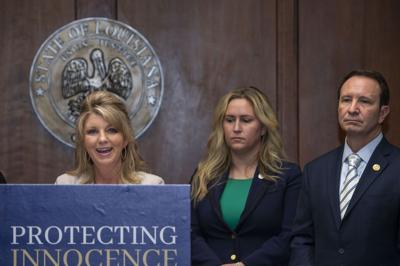A Louisiana Senate committee April 17 moved a step closer toward a major rewrite of the state’s public records laws that would decimate the state’s current law and help shield elected officials from mayors to the governor from scrutiny.
The Senate and Governmental Affairs Committee advanced two proposals targeting the public’s access to government records in the state, including one that would essentially gut the public’s current right-to-know laws.
Senate Bill 482 by Sen. Heather Cloud, a Ville Platte Republican, would exempt all Louisiana government agencies from turning over “any records involving opinions, recommendations, and deliberations in formulating decisions or policies" — basically any public records of note.
“I cannot sum up into words how much this will change the lives of citizens in this state,” said Scott Sternberg, general counsel to the Louisiana Press Association who advises news organizations including Gambit, in his testimony against the bill.
Currently, anyone can request records to government agencies’ communications as a way to get information about what their government officials are doing behind closed doors. As a result, public records requests have exposed government corruption and wrongdoing time and time again.
Cloud tried to say the bill, which would go into effect Aug. 1, would only put into Louisiana law a 2004 state court ruling that she said allows government bodies to deny request for “deliberative” records. She said it wouldn’t actually change access to records in the state.
But currently government agencies are not rejecting requests for such records. Fox 8 reporter Lee Zurik told the committee he files an average of 450 public records requests each year and has never had an agency deny his request on those grounds.
“There are some great attorneys in the state, some smart attorneys up there,” he said. “Someone would have used this in one of those 450 responses a year ... It is not existing law.”
Zurik said the press would not be able to “serve as a watchdog like we have done before” if the bill became law. InvestigateTV reporter Chris Nakamoto agreed, saying the proposal would be “devastating to all of us.”
“It’s intentionally vague, intentionally broad, and I’ve never seen anything like it before,” Nakamoto said.
The bill would also exempt from public records requests any record of the governor’s schedule, or that of the governor’s spouse or children, if it includes security details “that if made public may impair the safety of the governor, his spouse, or his child.”
In a statement in support of the bill, Gov. Jeff Landry said the current public records law “is stretched and is being abused and weaponized.” As attorney general, he sued a reporter for The Advocate for seeking public records from his office.
Cloud’s bill applies to public records from all government agencies, including local governments, school boards, library boards and beyond.
Sternberg said if the proposal were to pass, “you're never getting another LSU record again.”
Representatives from some good government groups also spoke against the bill, including Belinda Parker-Brown of Louisiana United International and Steven Procopio of the Public Affairs Research Council (PAR).
Procopio said PAR tries not to take positions on many bills but that they strongly opposed this one.
“If I had the option to put in five red cards, I’d do that,” he said.
Still, the committee voted 6-2 to advance the bill. Republican Sens. Blake Miguez, Mike Fesi, Caleb Kleinpeter, Gregory Miller, Mike Reese and Glen Womack voted for it, with Democratic Sens. Gary Carter and Sam Jenkins voting against it.
The committee also approved Senate Bill 502 by New Iberia Republican Sen. Blake Miguez, which lets government record keepers require "any Louisiana citizen” requesting public records “to provide sufficient information to establish the age and identification of the citizen.”
Record custodians can already ask for the age and ID of a person requesting public records. But under this law, they could require that information up front.
The bill defines “sufficient information” as “any electronic or physical document or identification card which includes a name, photograph and other identifying information.” It also specifies that if the person making the request is acting on behalf of a legal entity, they would need to include the name and physical address for that company or organization
Under the proposal, if they fail to provide that information, the custodian would not have to provide that person with public records.
Miguez said the bill was merely trying to verify real people are making public records request and not “some sort of bot or spammer,” citing concerns about Artificial Intelligence.
But some expressed concern about the bill using the language “Louisiana citizen.” Sternberg said lawmakers specifically changed language in the current law from allowing an “elector” to make a request to a “person.”
Similarly, Sen. Gregory Miller, a Norco Republican, said anyone “aggrieved by the government,” including people that don’t live in Louisiana, “should still have the same access to public records.”
“Maybe we should be trying to make sure that we provide this information where it’s easily accessible as opposed to behand a firewall,” he added.
Sen. Gary Carter asked if there could be a different method to combat bots making public records requests, pointing to steps many websites have where they ask users to complete tasks, such as selecting photos with stop lights.
PAR’s Procopio said he worried the bill would have a “chilling effect” on everyday people making public records requests.
“If you start asking citizens ‘OK, we need to see additional information or a driver’s license,’ then a lot of people, particularly not the professionals, will just be like, ‘I’m not going to deal with this. I don’t want the government to have any information that I don’t have to give to them,’” he said.
Miguez said he’d work to address concerns with the proposal, including with the Press Association. Nobody on the committee objected to moving the bill forward.
The future of THC seltzers, gummies and other consumable hemp products in Louisiana is up in the air.





